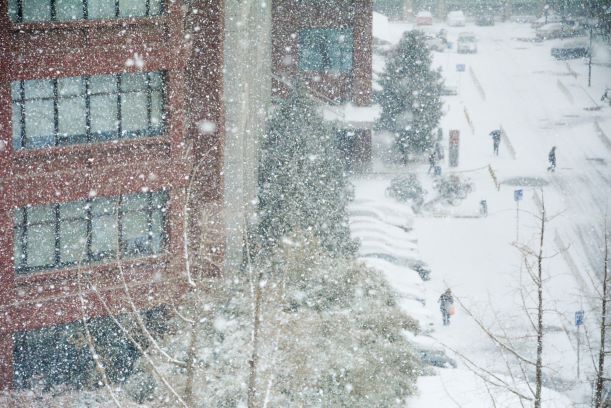Michigan is a beautiful midwest state that many residences are lucky to call home. Our state has the luxury of experiencing all four seasons throughout the year. It does mean our lovely state likes to throw crazy, record high or low days at us. Residences often claim how unpredictable the weather is from experiencing extremely hot October days to bitter winter chills in April. Michigan winters tend to be dreadful for most because they contain arctic air and wind chills that dip into the negatives. On the bright side, Michigan summers contain long days filled with sunshine, incredible sunsets, and lakes for water fun.
What was the coldest temperature ever recorded in Michigan?
If you thought last winter’s polar vortex was unbearably cold, it did not break the all-time lowest temperature record. WHAT? Many of you may find that information shocking based on the consecutive negative cold days experienced last winter. In fact, the coldest winter ever recorded in the state of Michigan was in the winter of 1994. In Vanderbilt, the record low temperature in Michigan dropped all the way to a negative 51 degrees Fahrenheit on both January 18th and February 4th. Each winter feels as if it is getting colder and taking longer for spring to come along. Michigan was ranked the 10th coldest state in 2019 according to the world population review. Based on annual temperatures, our glorious state out ranked notorious cold states such as Colorado, Iowa, and New York.
The following major cities show the average cold temperatures in degrees Fahrenheit:
- Alpena: 32.7°
- Detroit: 40.0°
- Flint: 37.7°
- Grand Rapids: 38.4°
- Houghton Lake: 33.5°
- Lansing: 37.2°
- Marquette: 29.9°
- Muskegon: 39.0°
- Sault Ste Marie: 31.1°
What is the record’s highest amount of snow precipitation in Michigan?
Due to the Great Lakes surrounding Michigan, the weather is dramatically impacted by the lake effect. This effect can be intense at times, producing extreme snowfall within those regions that spread across the entire state. In the winter of 1978-79, an Upper Peninsula town named Calumet had a total of 390.4 inches of snow. This small town is the snowiest place in Michigan.
What was the hottest temperature ever recorded in Michigan?
While Michigan is well known for having terribly cold winters, we actually enjoy warm, sunny summer days. An average summer day in Michigan can range between 70 to 80 degrees Fahrenheit. Some summer days have a chance of spiking into high heat spectrums or cool breezes. The hottest temperature in Michigan rose all the way to 112 degrees Fahrenheit in the northern city of Mio on July 13th, 1934. It is common for sandy regions in Michigan to heat up quickly based on the range of beaches.
The following major cities show the average highest temperatures in degrees Fahrenheit:
- Alpena: 53.7°
- Detroit: 58.4°
- Flint: 56.8°
- Grand Rapids: 57.1°
- Houghton Lake: 53.5°
- Lansing: 57.1°
- Marquette: 49.1°
- Muskegon: 55.9°
- Sault Ste Marie: 49.4°
The coldest location in Michigan
Many people in Michigan have argued which city is the coldest but, the coldest ranked city is in the Upper Peninsula. The western city of Herman was ranked the coldest city in Michigan based on the state’s weather records. During the winter, Herman’s temperatures stay on an average low between 3 to 10 degrees Fahrenheit. On average the temperature in this frigid city is 39.1 degrees Fahrenheit.
The hottest location in Michigan
In Michigan, the hottest location is in the city of Ypsilanti. The city is located on the southeast side of the state, near Ann Arbor. In the height of the summer heat, the city can reach up to 83 degrees Fahrenheit. The average temperature in Ypsilanti is 50.2 degrees Fahrenheit according to the state’s annual temperature record.
Conclusion
Whether Michiganders are bunkering down for a horrible winter storm or beating the summer heat, we tend to bear through it. Michigan is filled with incredible seasons and great weather despite the extreme conditions that continue to break records.


